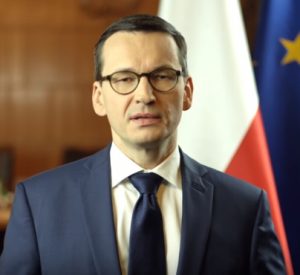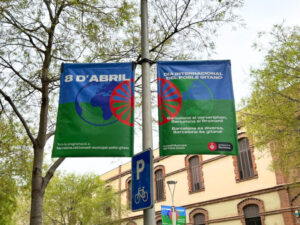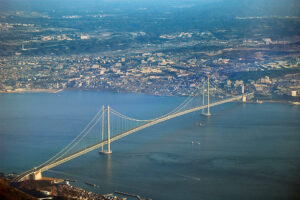 Il XX secolo ha portato al mondo l’indicibile sofferenza e la morte di centinaia di milioni di persone, uccise in nome di malate, totalitarie ideologie. Per le persone della nostra generazione, la morte inflitta dal nazismo, fascismo e comunismo è un dato di fatto. Ed è anche ovvio chi è responsabile di questi crimini e quale alleanza abbia iniziato la Seconda guerra mondiale, il conflitto più letale nella storia dell’umanità.
Il XX secolo ha portato al mondo l’indicibile sofferenza e la morte di centinaia di milioni di persone, uccise in nome di malate, totalitarie ideologie. Per le persone della nostra generazione, la morte inflitta dal nazismo, fascismo e comunismo è un dato di fatto. Ed è anche ovvio chi è responsabile di questi crimini e quale alleanza abbia iniziato la Seconda guerra mondiale, il conflitto più letale nella storia dell’umanità.
Purtroppo, più tempo passa da quei tragici eventi, meno li conoscono i nostri figli e i nostri nipoti. Per questo è importante raccontare a voce alta la verità sulla Seconda guerra mondiale, sui suoi artefici e sulle sue vittime, e opporsi a tutti i tentativi di falsificare la storia.
La memoria su quel male è particolarmente importante per la Polonia, la prima vittima della guerra. Il nostro paese è stato il primo a subire l’aggressione armata da parte della Germania di Hitler e della Russia sovietica. La Polonia è stata il primo paese che ha combattuto in difesa dell’Europa libera.
La resistenza a quelle potenze del male non costituisce tuttavia soltanto un ricordo dell’eroismo polacco, è qualcosa di molto più importante. Quella resistenza è l’eredità di tutta l’Europa libera e democratica, che ha combattuto contro i due totalitarismi. Oggi, quando alcuni, per i loro scopi politici, vogliono calpestare la memoria di quei eventi, la Polonia deve battersi in difesa della verità. Non per i propri interessi, ma nel nome di tutto quel che oggi rappresenta l’Europa.
L’atto Ribbentrop-Molotov, firmato il 23 agosto 1939, non era un „patto sulla non aggressione”. Era un’alleanza politica e militare che divideva l’Europa in due sfere di influenze, sulle linee dei tre fiumi polacchi: Narew, Vistola e San, spostata un mese più tardi sulla linea del fiume Bug, in seguito al “Trattato di frontiera e di amicizia” tra il III Reich e l’URSS, stipulato il 28 settembre. È stato un prologo per gli inimmaginabili crimini che sarebbero stati compiuti negli anni a venire a entrambi i lati di questa linea.
L’alleanza di Hitler e Stalin è stata immediatamente messa in atto: il 1 settembre 1939 la Germania hitleriana ha attaccato la Polonia dall’ovest, sud e nord e il 17 settembre l’URSS ha fatto la stessa cosa, attaccando dall’est.
Il 22 settembre a Brest, sul fiume Bug, ha avuto luogo una grande parata, i festeggiamenti della comune vittoria della Germania di Hitler e della Russia sovietica sulla Polonia indipendente. Questo tipo di parate non viene organizzato dalle parti stipulanti i trattati sulla non aggressione, lo fanno gli alleati e gli amici.
Così è stato con Hitler e Stalin, che a lungo sono stati non solo alleati, ma addirittura amici. L’amicizia era talmente forte che, quando un gruppo di 150 comunisti tedeschi, ancora prima dello scoppio della guerra mondiale, è fuggito dal III Reich nell’URSS, a novembre 1939 Stalin li ha consegnati ai tedeschi in una sorta di „regalo”, condannandoli a morte sicura.
L’URSS e il III Reich hanno strettamente collaborato tutto il tempo. Alla conferenza di Brest il 27 novembre 1939, i rappresentanti dei servizi di sicurezza dei due stati hanno discusso sui metodi e sulle regole della collaborazione per combattere le organizzazioni polacche indipendentiste sui territori occupati. Le successive conferenze tra i funzionari dell’NKVD e delle SS hanno avuto luogo, tra gli altri, a Zakopane e a Cracovia (marzo 1940). Non si parlava della non aggressione, ma di come liquidare (leggi: assassinare) le persone, i cittadini della Repubblica di Polonia e delle attività di forze alleate per annientare completamente la Polonia.
Senza la partecipazione di Stalin nella spartizione della Polonia e senza le risorse naturali che Stalin forniva a Hitler, la macchina tedesca del crimine non avrebbe conquistato l’Europa. Gli ultimi treni con i rifornimenti sono partiti dall’URSS verso la Germania il 21 giugno 1941, un giorno prima dell’attacco della Germania di Hitler contro il suo alleato. Grazie a Stalin, Hitler ha potuto impunemente conquistare un paese dopo l’altro, chiudere gli ebrei di tutto il continente nei ghetti e preparare l’Olocausto, uno dei più grandi crimini della storia dell’umanità.
Stalin compieva le azioni criminali nell’Est, sottomettendo alla sua autorità un paese dopo l’altro e sviluppando una struttura di campi, ai quali lo scrittore russo Aleksandr Solženicyn ha dato nome di „Arcipelago Gulag”. I campi, nei quali milioni di persone, contrarie al potere comunista, venivano, ridotte in schiavitù, sfinite con il lavoro massacrante.
I crimini del comunismo sono iniziati ancora prima della Seconda guerra mondiale, vi è stata la morte per fame dei milioni di russi all’inizio degli anni venti, l’Holodomor che ha provocato la morte di milioni degli abitanti dell’Ucraina e del Kazakistan, vi sono state le grandi purghe, nel corso delle quali sono stati uccisi circa 700 mila persone, fra gli oppositori politici e semplici cittadini dell’URSS, soprattutto i russi, vi è stata anche la cosiddetta „Operazione polacca” dell’NKVD, nel corso della quale sono stati fucilati soprattutto i cittadini dell’URSS di origini polacche. Alla morte sono stati mandati bambini, donne, uomini. Soltanto „nell’Operazione polacca”, in base ai dati dell’NKVD, sono stati fucilati 111 mila persone, uccise in modo premeditato dai comunisti sovietici. Essere polacchi nell’Unione Sovietica in quel periodo significava essere condannato a morte o ai lunghi anni di esilio.
La politica del crimine ha continuato il suo corso dopo l’aggressione sovietica contro la Polonia (il 17 settembre 1939), sono stati commessi i crimini come l’assassinio dei oltre 22 mila ufficiali polacchi e rappresentanti delle élites governative, a Katyn, Charkiv, Tver’, Kiev e Minsk – per elencare alcuni – e anche nei luoghi di torture dell’NKVD e nei lager situati nei posti più remoti dell’impero sovietico.
Le più grandi vittime del comunismo sono stati i cittadini russi. Gli storici stimano che soltanto nell’Unione Sovietica sono state assassinate 20, fino a 30 milioni di persone. La molte e i lager aspettavano persino coloro che ogni paese civilizzato protegge con cura: i prigionieri di guerra che tornavano a casa. L’URSS non li trattava come gli eroi di guerra, ma come i traditori. Questa era “la gratitudine” della Russia sovietica per i prigionieri-soldati dell’Armata Rossa: la morte, i lager, i campi di concentramento.
Sono responsabili di tutti questi crimini i leader comunisti, a capo con Josef Stalin. Intraprendere dei tentativi, a 80 anni dallo scoppio della Seconda guerra mondiale, di riabilitare questo personaggio per gli scopi politici dell’attuale Presidente della Russia deve suscitare proteste di tutti coloro che hanno anche solo una conoscenza di base della storia del XX secolo.
Il Presidente Putin ha numerose volte mentito a proposito della Polonia. Lo ha fatto sempre in modo pienamente consapevole. Di solito questo accade quando il potere a Mosca sente la pressione internazionale dovuta alle proprie azioni. Non è la pressione che si riconduce alle questioni storiche, ma è la pressione di carattere geopolitico. Nelle ultime settimane, Ia Russia ha subito alcune importanti disfatte: non è riuscita a sottomettersi completamente la Bielorussia, l’Unione Europea ha di nuovo rinnovato le sanzioni per via dell’illegittima annessione della Crimea e i colloqui all’interno del cosiddetto „Format Normandia” non solo non hanno portato alla revoca delle sanzioni, ma nello stesso tempo sono arrivate le nuove restrizioni, questa volta da parte degli USA, che rendono molto più difficile la realizzazione del progetto Nord Stream 2. E nel frattempo, gli sportivi russi sono stati sospesi per quattro anni per il doping.
Vedo nelle parole del Presidente Putin il tentativo di nascondere tutti questi problemi. Il leader russo si rende benissimo conto che le sue accuse non hanno nulla a che fare con la realtà e che in Polonia non vi sono né monumenti dedicati a Hitler né a Stalin. I monumenti del genere si trovavano sul nostro suolo solo quando venivano eretti dagli aggressori e dai criminali, dal III Reich e dalla Russia sovietica.
Il popolo russo, la più grande vittima di Stalin – uno dei criminali più crudeli nella storia del mondo – merita di conoscere la verità. Sono profondamente persuaso che la nazione russa è una nazione di persone libere e che respinge lo stalinismo, anche quando il potere del presidente Putin cerca di riabilitarlo.
Non diamo il nostro consenso a confondere i carnefici con le vittime, fautori dei crudeli crimini sulle popolazioni innocenti e i paesi aggrediti. Nel nome della memoria delle vittime e nel nome di un futuro comune dobbiamo coltivare la verità.
Mateusz Morawiecki
Presidente del Consiglio dei Ministri
Statement by the Prime minister of Poland Mateusz Morawiecki
29.12.2019
 The 20th century brought the world inconceivable suffering and the death of hundreds of millions of people killed in the name of sick, totalitarian ideologies. The death toll of Nazism, fascism and communism is obvious for people of our generation. It is also obvious who is responsible for those crimes – and whose pact started World War II, the most murderous conflict in the history of humankind.
The 20th century brought the world inconceivable suffering and the death of hundreds of millions of people killed in the name of sick, totalitarian ideologies. The death toll of Nazism, fascism and communism is obvious for people of our generation. It is also obvious who is responsible for those crimes – and whose pact started World War II, the most murderous conflict in the history of humankind.
Unfortunately, the more time passes since these tragic events, the less our children and grandchildren know about them. That is why it is so important that we continue to speak out loud, telling the truth about World War II, its perpetrators and victims – and object to any attempts at distorting history.
The memory about this evil is particularly important for Poland – the war’s first victim. Our country was the first to experience the armed aggression of Nazi Germany and Soviet Russia. Poland was the first country that fought to defend free Europe.
However, resistance to these evil powers is not only the memory of Polish heroism – it is something much more important. This resistance is the legacy of the entire now free and democratic Europe that fought against two totalitarian regimes. Today, when some want to trample the memory of these events in the name of their political goals, Poland must stand up for the truth. Not for its own interest, but for the sake of what Europe means.
Signed on 23 August 1939, the Molotov-Ribbentrop pact was not a “non-aggression pact.” It was a political and military alliance, dividing Europe into two spheres of influence – along the line formed by three Polish rivers: the Narew, Vistula, and San. A month later it was moved to the line of the Bug river, as a result of the “German-Soviet Boundary and Friendship Treaty” of 28 September 1939. It was a prologue to unspeakable crimes that over the next years were committed on both sides of the line.
The pact between Hitler and Stalin was immediately put into effect: on 1 September 1939 Nazi Germany invaded Poland from the west, south and north, and on 17 September 1939 the USSR joined in, attacking Poland from the east.
On 22 September 1939 a great military parade was held in Brest-Litovsk – a celebration of Nazi Germany’s and Soviet Russia’s joint defeat of independent Poland. Such parades are not organised by parties to non-aggression pacts – they are organised by allies and friends.
This is exactly what Hitler and Stalin were – for a long time they were not only allies but in fact friends. Their friendship flourished so much that, when a group of 150 German communists fled the Third Reich to the USSR before World War II broke out, in November 1939 Stalin handed them over to Hitler as “a gift” – thus condemning them to a certain death.
The USSR and the Third Reich cooperated closely all the time. At a conference in Brest on 27 November 1939, representatives of both countries’ security services discussed the methods and principles of cooperation to fight Polish independence organisations on the occupied territories. Other conferences of the NKVD and SS officers on their cooperation were held inter alia in Zakopane and Krakow (in March 1940). These were not talks on non-aggression – but on liquidating (that is murdering) people, Polish citizens, and on joint, allied actions to bring about a total destruction of Poland.
Without Stalin’s complicity in the partition of Poland, and without the natural resources that Stalin supplied to Hitler, the Nazi German crime machine would not have taken control of Europe. The last trains with supplies left the USSR and headed for Germany on 21 June 1941 – just one day before Nazi Germany attacked its ally. Thanks to Stalin, Hitler could conquer new countries with impunity, lock Jews from all over the continent in ghettos, and prepare Holocaust – one of the worst crimes in the history of humankind.
Stalin engaged in criminal activities in the east, subduing one country after another, and developing a network of camps that the Russian Alexander Solzhenitsyn called “the Gulag Archipelago.” These were camps in which a slave, murderous torture was inflicted on millions of opponents of the communist authorities.
The crimes of the communist regime started even before the outbreak of World War II –the starvation of millions of Russians at the beginning of the1920s, the Great Famine which led to the death of many millions of inhabitants of Ukraine and Kazakhstan, the Great Purge during which nearly 700 thousand political opponents and ordinary citizens of the USSR, mostly Russians, were murdered, and the so-called “Polish Operation” of the NKVD in which mainly the USSR citizens of Polish descent were shot to death. Children, women and men were destined to die. In the “Polish Operation” alone, according to the NKVD data, over 111 thousand people were shot to death deliberately by Soviet communists. Being a Pole in the USSR at that time meant a death sentence or many years of exile.
This policy was continued with crimes committed after the Soviet Union invaded Poland on 17 September 1939 – the crime of murdering over 22 thousand Polish officers and representatives of elites in places such as Katyn, Kharkiv, Tver, Kyiv, and Minsk, the crimes committed in the NKVD torture cells and in forced labour-camps in the most remote parts of the Soviet empire.
The greatest victims of communism were Russian citizens. Historians estimate that between 20 and 30 million people were killed in the USSR alone. Death and forced labour-camps awaited even those that every civilised country provides care for – prisoners of war that returned to their homeland. The USSR did not treat them as war heroes but as traitors. That was the Soviet Russia’s “gratitude” for prisoners of war – soldiers of the Red Army: death, forced-labour camps, concentration camps.
Communist leaders, Joseph Stalin in the first place, are responsible for all these crimes. Eighty years after World War II started, attempts are made to rehabilitate Stalin for political goals of today’s President of Russia. These attempts must be met with strong opposition from every person who has at least basic knowledge about the history of the 20th century.
President Putin has lied about Poland on numerous occasions, and he has always done it deliberately. This usually happens when Russian authorities feel international pressure related to their activities – and the pressure is exerted not on historical but contemporary geopolitical scene. In recent weeks Russia has suffered several significant defeats – it failed in its attempt to take complete control over Belarus, the EU once again prolonged sanctions imposed on it for illegal annexation of Crimea, the so-called “Normandy Format” talks did not result in lifting these sanctions and simultaneously further restrictions were introduced – this time by the US, significantly hindering the implementation of the Nord Stream 2 project. At the same time Russian athletes have just been suspended for four years for using doping.
We consider President Putin’s words as an attempt to cover up these problems. The Russian leader is well aware that his accusations have nothing to do with reality – and that in Poland there are no monuments of Hitler or Stalin. Such monuments stood here only when they were erected by the aggressors and perpetrators – the Third Reich and the Soviet Russia.
The Russian people – the greatest victim of Stalin, one of the cruellest criminals in the history of the world – deserve the truth. We firmly believe that Russians are a nation of free people – and that they reject Stalinism, even when President Putin’s government is trying to rehabilitate it.
There can be no consent to turning perpetrators into victims, those responsible for cruel crimes into innocent people and attacked countries. Together we must preserve the truth – in the name of the memory about the victims and for the good of our common future.






